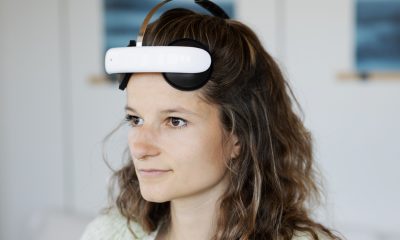Fitness
How to cope when you’ve just learned you have cancer
If you’re having trouble coping with cancer or you know someone who is, the points below can help. Not just physically, but emotionally as well.

The news that you have cancer is not something anyone wants to hear. Even as treatable as it may be, you might find yourself straining to cope. No one would blame you. But developing resilience is important for fighting, not just for you but for those around you. If you’re having trouble coping with cancer or you know someone who is, the points below can help. Not just physically, but emotionally as well.
Get the facts
The thing that’s most important is knowing all the facts. Some might think that learning more about the diagnoses is an idea not worth bearing. But it’s important to have all the facts on what kind of cancer you have, where it has or might spread and what treatments are possible. There are all kinds of treatments you might go under such as a hip replacement or several rounds of chemotherapy. Knowing what’s coming up is the best way to brace yourself.
Complementary treatments
It’s common that patients may not feel entirely happy waiting solely for the prescribed treatments. Complementary treatments are worth considering if they put you any more at ease, reduce your pain or even have a solely mental effect. Just check up with your doctor if you’re unsure if a treatment might get in the way of what they have prescribed.
Taking care of your health
Now, more than ever, is it worth taking closer care of your health. It’s necessary to maintain a healthy diet now to make your body as strong as possible against upcoming treatments. This means getting rid of bad habits such as smoking, as well. Pushing towards physical health not only has the obvious benefits for your body. It’s also good for the mind.
Your emotional health
Staying emotionally healthy might seem very difficult when you’re first diagnosed, perhaps even impossible. The attitude you carry with you through your treatment can change the whole experience, however. There are a lot of potential different feelings you might have to cope with. Denial. Overwhelming. Anger. Find ways to help yourself relax and don’t force yourself to act upbeat if you’re not. Staying positive is important but it’s better to get there with the help of friends and family instead of putting up a façade.
Your loved ones
A lot of patients feel a significant burden when thinking of their loved ones. It might be the reason they think it’s necessary to put up a façade. To be strong and protect them. That can make you feel more alone than anything, however. Find the people you can be honest with and express yourself. Most people are a lot more resilient and supportive in this kind of crisis than you might imagine.
Anticipating the physical changes
It is very likely you will undergo some physical changes when diagnosed with cancer. Particularly in the treatment. These changes can have a profoundly negative effect for self-image and confidence. Anticipating them and learning about what changes you might go over makes it easier to acclimate to. Over all, this is a period of great upheaval so being forewarned can make it at least somewhat smoother.
Fitness
Treatment options to help overcome knee pain for sports enthusiasts
“Sports-related pain should be evaluated quickly, especially when it’s difficult to put weight on the knee, swelling occurs or there is restricted range of motion,” said Dr. Alexander Meininger, orthopedic surgeon and MACI consultant.

Millions of people experience chronic pain, with knee pain among the most common. Athletes and active adults know the impact activities like running and skiing can have on their knees, but when chronic knee pain makes it difficult to do those activities, or even day-to-day tasks like walking up the stairs, people may often face challenges.
According to the journal “Cartilage,” unlike other tissues, cartilage does not repair itself and, without proper treatment, can worsen over time and become more difficult to treat. However, options like FDA-approved knee cartilage repair surgery MACI (autologous cultured chondrocytes on porcine collagen membrane) uses a patient’s cells to help repair cartilage defects and may help alleviate knee pain.
“Sports-related pain should be evaluated quickly, especially when it’s difficult to put weight on the knee, swelling occurs or there is restricted range of motion,” said Dr. Alexander Meininger, orthopedic surgeon and MACI consultant.
Justin Keys, a former patient of Meininger and avid skier, knows that the long-term outcomes of knee cartilage surgery can be worth the short-term sacrifices. After several injuries, including an ACL injury, Keys struggled with most activities except walking on flat, paved surfaces. After consulting with Meininger, Keys chose knee cartilage repair to help get back to his active lifestyle.
Keys considered whether to manage the injury as-is or choose MACI and undergo rehabilitation to potentially get back to his favorite activities in the future. He knew he could no longer use short-term relief methods and had to address his pain with a treatment to help provide lasting relief.
For athletes like Keys who want to fix knee pain, it’s important to consider these steps:
Discuss Options with Your Doctor
Patients should talk to their doctors and undergo an MRI to help assess the internal structures of the knee. Meininger recommends patients and their doctors discuss options for long-term knee restoration health, preserving function for future decades and recognizing the short-term sacrifice.
Set Yourself Up for Success
Experts like Meininger suggest patients take steps ahead of surgery to help their recovery.
“The important thing is to be as fit as possible and use the preseason months to undergo surgery and rehab,” Meininger said.
Patients can take steps to prep their home for recovery, which may include:
- Bringing necessities down from hard-to-reach shelves
- Moving furniture to ensure clear pathways
- Installing shower safety handles to minimize potential falls
The Road to Rehab and Recovery
Rehabilitation takes time and everyone’s experience is unique. It can be as much of a mental challenge as it is physical. Committing to a physical therapy regime, staying hydrated and eating well are important aspects to support recovery. Patients should talk to their doctors with questions and before starting any exercises.
IMPORTANT SAFETY INFORMATION
Do not use if you are allergic to antibiotics such as gentamicin or materials from cow or pig; have severe osteoarthritis of the knee, other severe inflammatory conditions, infections or inflammation in the bone joint and other surrounding tissue or blood clotting conditions; had knee surgery in the past 6 months, not including surgery for obtaining a cartilage biopsy or a surgical procedure to prepare your knee for a MACI implant; or cannot follow a rehabilitation program post-surgery.
Fitness
6 Exercise safety tips
Now, as social restrictions ease, you may find yourself stepping up your workouts, whether you’re training for an event or working to improve your game in a recreational league.

In the wake of the COVID-19 pandemic, many Americans are more aware of their health and wellness. Now, as social restrictions ease, you may find yourself stepping up your workouts, whether you’re training for an event or working to improve your game in a recreational league.
Sprains, strains and injuries can happen to even the most seasoned athletes. When you’re testing your limits, even a minor injury can alter your performance. Consider products and supports like these from the CURAD Performance Series product line, available at Walmart and Amazon, to help you get back in the game quickly and safely.
Find more resources to support your fitness journey at CURAD.com.
Keep Dirt and Germs Away
The more active you are, the harder it can be to find a bandage that stays with you all day or all game long.
Spray Away Sore Spots
Controlling mild pain can help keep you at the top of your game, and a topical analgesic works fast to heal common pain brought on by fitness and exercise, such as pain in knees, feet, shoulders and backs.
Put Pain in the Past
When recovery becomes the name of the game and pain relief is needed after daily workouts or bodily injuries. Cold packs work to heal bruises, reduce swelling and relieve headaches and general pain points while microwavable heat packs provide satisfying heat therapy to address sore and stiff joints, muscle cramps and tension.
Reduce Impact of Knee Strain
Weak, injured or arthritic knees can come from many sources, including tendonitis and a wide range of conditions that result in strain or overuse. An adjustable band can provide support for on-field sports and during workouts or everyday activities.
Manage Pain and Relieve Pressure
If you participate in endurance and strength exercises or certain sports, you may ask a lot of your joints. Kinesiology tape can be configured a multitude of ways to help reduce pain and improve blood circulation, as well as relieve tension and pressure.
Control Back Strain
When your back is strained, your body and performance can suffer. A mild or moderate sprain can benefit from strong support and compression.
Fitness
Exercise can provide relief for dry, itchy eyes
A significant increase in tear secretion and tear film stability after participating in aerobic exercise can be another remedy for relieving dry, itchy eyes.

A team led by researchers from the University of Waterloo discovered that a significant increase in tear secretion and tear film stability after participating in aerobic exercise can be another remedy for relieving dry, itchy eyes.
Every time we blink, our eyes are covered in tear film—an essential protective coating necessary for maintaining healthy ocular function. Healthy tear film comprises three layers–oil, water, and mucin–that work together to hydrate the ocular surface and protect against infection-causing irritants like dust or dirt.
When any part of the tear film becomes unstable, the ocular surface can develop dry spots, causing eye symptoms like itchiness or stinging and burning sensations.
“With so much of our activity tied to screen usage, dry eye symptoms are becoming increasingly common,” said Heinz Otchere, a PhD candidate in vision science at Waterloo. “Instead of having to use eye drops or other alternative treatments, our study aimed to determine if remaining physically active can be an effective preventative measure against dryness.”
Fifty-two participants were divided into two groups—athlete and non-athlete—to participate in an exercise session. Participants in the athlete group exercised at least five times per week, while non-athlete participants exercised no more than once per week. Researchers, which included experts from the University of Cape Coast in Ghana, performed visual examinations before and five minutes after each exercise session, where tear secretion and tear break-up time were assessed.
While participants in the athlete group showed the largest increase, Otchere says all participants experienced a meaningful boost in tear quantity and tear film stability after the exercise session.
“It can be challenging for people to regularly exercise when the demand is there to work increasingly longer hours in front of screens,” Otchere said. “However, our findings show physical activity can be really important for not just our overall well-being, but for our ocular health too.”
The study, Differential effect of maximal incremental treadmill exercise on tear secretion and tear film stability in athletes and non-athletes, was co-authored by Otchere, the University of Cape Coast’s Samuel Abokyi, Sekyere Nyamaah, and Michael Ntodie, and Ghana’s Our Lady of Grace Hospital’s Yaw Osei Akoto. It was recently published in the Experimental Eye Research journal.
-

 Product Showcase3 weeks ago
Product Showcase3 weeks agoKorean brand Wells showcases 23 years of engineering innovation
-

 NewsMakers3 weeks ago
NewsMakers3 weeks agoMillennials and Gen Zs prioritize health, purpose, financial independence, but health and wellness gaps persist
-

 Destinations4 weeks ago
Destinations4 weeks agoChecking religious expression at Montemaria in Batangas
-

 Product Showcase3 weeks ago
Product Showcase3 weeks agoAIA Philippines CEO named Executive Champion of the Year in Asia
-

 Product Showcase2 weeks ago
Product Showcase2 weeks agoManulife brings personalized gut health insights to PH
-

 Destinations2 weeks ago
Destinations2 weeks agoChecking out Street Halo-Halo Milky Ice
-

 Product Showcase7 days ago
Product Showcase7 days agoSip the magic of Christmas with Seattle’s Best S’mores Ghirardelli Collection
-

 NewsMakers7 days ago
NewsMakers7 days agoAt-home brain stimulation prevents depression relapse in 3 out of 4 patients, study finds













